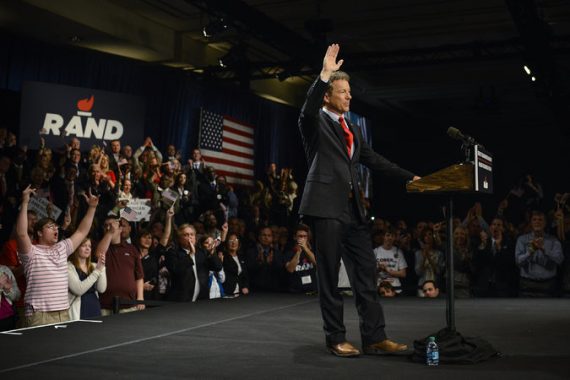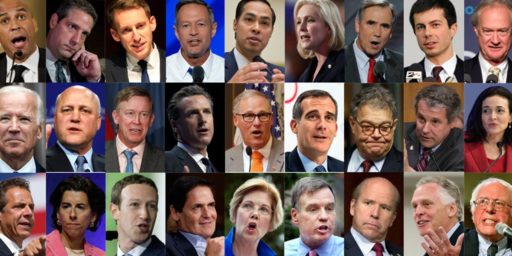Rand Paul Buys Himself A Caucus So He Can Run For Two Offices At Once
Thanks to $500,000, Rand Paul bought himself a caucus so he can run for two offices at once.
Rand Paul faced a potentially big problem next year thanks to a provision of Kentucky’s election law that forbids a candidate from appearing on a ballot for two different offices at the same time. Paul, of course, is running for President in 2016 and the Kentucky primary would likely be one that he would do well in. However, Paul’s Senate seat is also up for re-election next year. Because of Kentucky’s law, Paul would have either had to give up his bid to be re-elected to the Senate, which is essentially serving as a fall back for his Presidential ambitions right now, or he would have had have forgone Kentucky’s primary altogether, which would have been quite odd to say the least. Over the past year, Paul and his allies in Kentucky had attempted to get the law changed to allow to run for both position, but Kentucky’s Senate is controlled by the Democrats and the Governor is a Democrat and they weren’t exactly inclined to make life easier for Senator Paul.
With the legislative option dead, Paul’s only hope was to convince the Kentucky Republican Party to switch from a primary for the Presidential race to a caucus. If this happened, then the law would not be implicated for the primary because Paul would not be appearing on the ballot for two different positions. For several months, it appeared as though Paul would be able to get this approved quite easily. In recent weeks, though, the outcome of the vote on the matter set for today was thrown into doubt, in part because many Republican leaders objected to the idea of the party footing the bill for a caucus primarily for the benefit of Rand Paul, which could end up costing up to $500,000. In response to these concerns, Paul agreed to cover the costs of the caucus, but with even with that promise, there were still doubts about whether the state GOP’s Central Committee would agree to make the change heading into today’s vote.
After the Committee met behind closed doors today, though, they ended up approving the motion, with the requirement that Rand Paul put up the money to pay for it:
Sen. Rand Paul (R-Ky.) avoided a major headache Saturday after Kentucky Republican Party approved a rule change that would allow him to run for president while seeking reelection to his Senate seat.
“I applaud the Republican Party of Kentucky on their decision to hold a caucus in the upcoming Republican presidential cycle,” Paul said in a statement. “The people of Kentucky deserve a voice as the GOP chooses their next nominee, and holding a caucus will ensure that Kentucky is relevant and participates early in the process.”
The party’s central committee approved Kentucky’s first-ever presidential caucus for March 5, 2016. The vote was 111 to 36, a stronger showing than expected, after a drama that took most of the day — ending just 20 minutes before the meeting had to end. Two-third of the central committee were needed to approve the caucus.
Paul himself attended the vote at Frankfort, Kentucky’s Capital Plaza, lobbying in person for the right to remain a 2016 candidate without further turmoil. Senate Majority Leader Mitch McConnell (R-Ky.), who has endorsed his colleague’s presidential bid, endorsed the caucus, and dispatched his state director to say so at the meeting.
Paul’s presidential campaign worked hard to show Republicans the campaign that they would be hurting if they voted down the plan. On Tuesday, his campaign e-mailed Kentucky supporters to ask if they would help organize a caucus. “Moving the primary to a caucus is a great help to my campaign,” Paul wrote, “and I appreciate the people of the Republican Party in Kentucky working on this with me.” On Thursday, a Facebook post and Eventbrite link were created to promote a “stand with Rand” rally in support of “the first-ever Kentucky Republican Presidential Caucus.” On Facebook, the announcement was “liked” more than 1000 times and shared more than 100 times.
The result was that the Kentucky GOP’s decision makers arrived at the hotel to see around 50 of Paul’s supporters, some given T-shirts and posters by the campaign, cheering on the candidate. “No matter what happens today, we’ll be running for the presidency and we’ll be running for re-election,” Paul said,according to reporter Sam Youngman.
Tom Loftus at the Louisville Courier-Journal has more:
Kentucky Republican central committee voted Saturday to replace the presidential primary with a caucus format to allow Sen. Rand Paul to run for president and not give up his Senate re-election options.
The approval carries the condition that Paul’s campaign transfer an initial payment of $250,000 to the group by Sept. 18 to pay for the caucuses.
At Paul’s request, the Republican Party of Kentucky’s central committee met Saturday to vote on the plan.
The plan calls for the party to drop out of the traditional May presidential primary election and initiate Republican presidential caucuses to be held March 5. The move would solve Paul’s problem with a Kentucky law that bars a candidate from running for two offices on the same ballot and allow him to seek Kentucky’s presidential delegates at the caucuses and run for U.S. Senate in the later primary.
Paul has pledged that he will provide enough money to assure that the caucuses – estimated to cost $500,000 – can be held at no expense to the Republican Party of Kentucky.
Central committee members voted 111-36 to approve the switch to caucuses. Approval required yes votes of at at least two-thirds of those voting, or at least 98 members.
“It’s a great day. As you know, winning a two-thirds vote is not easy, and we exceeded two-thirds,” Paul said afterward. “We had a really, I think, a great discussion. It’s almost a little bit like being on a jury. There’s back and forth, and back and forth. Ultimately I think people got to the point where they were very comfortable with the idea.”
It’s hard not to walk away from this with anything other than the impression that Paul is buying a method to get himself around a law that would otherwise bar him from running for President while also running for what most every observer believes would be a safe bid for his party’s nominate for Senate. Other than the purpose of allowing Paul to get round the law, there doesn’t seem to be any other logical reason for the Kentucky Republican Party to agree to a caucus rather than a primary. For one thing, as I’ve noted before, caucuses are an inherently flawed way to pick nominees when compared primaries. Because they often take place in the evenings, the number of people who are even able to show up is dramatically smaller than the number of people able to show up to vote in a primary. Caucus schedules are also difficult for people who have to work in the evenings, and families with children who can’t find a babysitter. Additionally, there is no absentee voting in a caucus so anyone who is out of state on caucus day will be unable toa vote, as will residents of Kentucky who are in the military and stationed out of state. Beyond these concerns, switching from a primary to a caucus arguably dilutes Kentucky’s importance in the Presidential race. Add into this the fact that holding a caucus deprives the Kentucky GOP of voter data that they could use in the General Election, and it’s hard to see exactly why they would have agreed to do this.
The answer to that question, of course, is a combination of the fact that Paul has many allies in the Central Committee, both on his own and thanks to his close relationship with Senate Majority Leader Mitch McConnell and the fact that Paul agreed to foot the bill. In essence, Rand Paul bought a caucus so that he continue what seems like an increasingly quixotic Presidential bid notwithstanding the fact that caucuses are undemocratic, unfair, and end up being unrepresentative. The Kentucky GOP gets absolutely no benefit out of this other than the fact that it won’t have to pay for it. Given the fact that Paul’s campaign doesn’t seem to be going anywhere, it all seems to be incredibly pointless. Well, perhaps that’s unfair. The obvious point of this was to allow Paul to continue running for President, so I guess it succeeded in that respect. Exactly what it does for the voters of Kentucky, though, I have no idea.







What an A hole, I hope he loses both elections.
Ah, the Republican idealist, the man with strong beliefs, the man who eschews the usual political games. Just another hustler. And a delusional one at that.
If Paul were a serious contender for 2016 I could understand this, but he’s not.
Also, I could understand if he had been asking the Kentucky GOP to switch the Senate primary to a caucus, especially since it looks like he won’t even have a primary opponent next year on the Senate side. Why they felt the need to mess with the Presidential primary I don’t understand.
Just out of curiosity where can this money come from? Can it come from a PAC or does it have to come out of his own campaign?
Since Paul is saying he will be the one paying for it, I take that to mean it will come from either his Senate campaign account or his Presidential campaign account. There’s more than enough cash on hand in both to cover the $500,000 cost.
I don’t believe the money could come from a SuperPAC because of FEC limitations on what they can do.
But money is free speech so First Amendment, right?
(we Americans are so stupid….)
@Doug Mataconis:
It’s odd to say the least. If he’s running to win, he’s delusional. If he’s running to push his ideals he discredits himself with a blatant political maneuver to cling to power.
@michael reynolds:
Ideas. Geez, writers! ;0)
So all of these comments would be the same if this was a sitting Democratic senator who had to resort to similar shenanigans because of an idiosyncratic state law, right? Or is it just because you don’t like Rand Paul/Republicans? Just for the record.
@Doug Mataconis: So money still can’t buy you (him) love, but it sure can buy a reasonable facsimile thereof….
Just for the record Jimmy, commenters at OTB that you side with are model citizens and those with whom you disagree are _______.
U can fill in the blank.
@Jim R:
So instead of having an actual example of “both sides do it” you invent a scenario where “both sides do it” to condemn the hypothetical hypocritical libtards that exist in your head?
But, if he somehow becomes his party’s nominee, he has to withdraw from the Senate run, right? Or is there a plan afoot to have two separate ballots so his name won’t be on the same ballot for two offices simultaneously?
(Also, the Democrats should have just changed the law — but they should have gotten something in return. An increase in funding for something relatively modest, perhaps.)
A lot of this boils down to whether you think that the law about running for two offices on a single ballot is just. Because the spirit behind that provision is being violated, no question.
Other than that, it’s just plain ugly to have such a transparent buyout of an election. Sure, the Republican party is allowed to choose the format. And left to their own devices, there would be some internal influences based on what candidate they thought might be advantaged by a given format. But to allow one of the candidates to outright buy it? That doesn’t reflect well on the party.
@de stijl: “Hypocritical libtards”? LOL…projection, much?
Sorry if my question was too difficult for you to contemplate…your response (and the many down votes) was about what I expected, because I know it’s generally ” TEAM BLUE GOOD, TEAM RED BAD ” around here. Me, I’m an Independent and have no skin in this game. I don’t much care who wins the Republican nomination as I almost certainly won’t be voting for that person, and it’s not going to be Rand Paul any case. Paul does come out looking like a jerk here, though I think it’s a stupid law the likes of which most candidates for president clearly never have to contend with. But hey, if you want to pretend that a Sen. Obama or Clinton, faced with the same dilemma, would have taken the “noble” route and essentially forfeited their home state’s primary, be my guest.
@Gustopher:
No, they shouldn’t change it. Elections cost money and special elections cost more. He could win both races. Why should the taxpayer foot the bill for someone who doesn’t want to go out and get a real job like everyone else? And take it to the extreme, if Rand can run for 2 offices at once, why can’t someone else run for 5 or 6 at once?
The real fun question is, what happens if he does get back into the race, and truly has to run for two offices at the same time. Might as well cost the R a senate seat if the D find a reasonable challenger.
Is this any surprise?
This is the same guy who started his own ophthalmology board to certify his practice of medicine. Apparently, the board no longer exists but he continues to claim he is “board certified.”
http://www.washingtonpost.com/politics/how-rand-paul-tried-to-lead-an-eye-doctors-rebellion/2015/02/01/010994da-9cd6-11e4-a7ee-526210d665b4_story.html
His Presidential bid isn’t the only thing that’s quixotic. I’m not even sure what he hopes to accomplish in the Senate. Another failed filibuster?
If Paul had been forced to choose, I’m not sure he would have gone with the Senate race. He doesn’t seem to enjoy it, he hasn’t displayed any great influence on the body, and I don’t think he needs it as a launchpad for a future presidential run.
The reason it is hard to not have that impression is because that IS PRECISELY WHAT JUST HAPPENED.